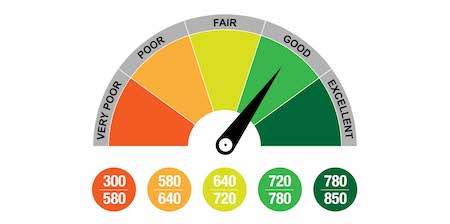If you are interested in fixing your credit, living a creditworthy life, having and maintaining a good credit score, you are at the right place. This is one of the most interesting article, under this topic, you have ever read. This article presents ‘the importance of good credit,’ geared at answering 3 major credit questions:
- What is a good credit score?
- Why is it important?
- What are some areas where credit is important? (5).
What is a good credit score?
It’s an age-old question, and to answer it requires that we start with the basics: What is a credit score, anyway?
Generally speaking, a credit score is a three-digit number ranging from 300 to 850. Credit scores are calculated using information in your credit report, including your payment history; the amount of debt you have; and the length of your credit history.
Credit scores are used by potential lenders and creditors, such as banks, credit card companies or car dealerships, as one factor when deciding whether to offer you credit, like a loan or credit card. It’s one factor among many to help them determine how likely you are to pay back money they lend.
Although ranges vary depending on the credit-scoring model, generally credit scores from 580 to 669 are considered fair; 670 to 739 are considered good; 740 to 799 are considered very good; and 800 and up are considered excellent. Higher credit scores are good credit scores. It means you have demonstrated responsible credit behavior in the past, which may make potential lenders and creditors more confident when evaluating a request for credit.
Why is it important?
To answer this question with clarity let’s explore a few ways credit could play a role in your life and learn the benefits that come with having good credit.
Your credit profile can influence your chances of qualifying for loans and credit cards. Lenders generally see those with credit scores 670 and up as acceptable or lower-risk borrowers. Most people know that. But it can also play a role in decisions made by insurance companies, landlords, utilities and employers, too.
Your credit history is an indication of how you’ve managed debt in the past, and many companies use it to predict your future financial behaviors. So, when you apply to do things like borrow money, get a credit card or rent an apartment, your credit history may be looked at. Good credit scores may suggest you’re responsible and practice good financial habits, like paying your bills on time. But low credit scores may give the impression that you are not trustworthy.
Certain factors, if met, position your credit for a good score. Examples of such factors are:
i. Payment of your bills on time, every time.
ii. Keeping of your credit card balance well below the limit.
iii. Paying off your debts
iv. Apply for credit sparingly
v. Check your credit reports regularly.
If the above factors are consistently met, your credit score is sure to be high.
Areas Where Credit Is ImportantMortgages and Auto Loans
When you’re trying to do things like buy a home or finance a car, having good credit may help you qualify to borrow, and borrow at lower interest rates.
Credit Cards
When you apply for a credit card, the card issuer may check your credit. Good credit may give you more options, and if you’re approved, good credit may also make you eligible for things like a higher credit limit and a lower annual percentage rate (APR).
Insurance and Utilities
Your credit history may even influence how much you pay for an insurance policy.
Job Applications
If you apply for a job, some employers may ask to run a background screening, which can include a credit check. It’s especially typical for jobs that involve finances or sensitive information.
Housing Applications
Landlords often request permission to run screenings, but they’re not always required to do so. Sometimes requests are included in rental applications. When you apply for a lease to rent an apartment or a house, the landlord may check your credit history—in addition to your criminal and rental histories.
Now that you’ve seen why credit is so important, you may wonder how you can track it. Aside from knowing where you stand, monitoring your credit can also help you spot reporting errors and potential fraud attempts.
Visit www.thecreditsorcerer.com for help with all of that. All the credit solutions you require will be made available for you. No matter how much time, and cash you have to put in to monitor your credit, just know you’re taking an important step to develop good credit habits.
We hope you found this article helpful. Our content is not intended to provide legal, investment or financial advice or to indicate that a particular Credit Sorcerer product or service is available or right for you. For specific advice about your unique circumstances, consider talking with a qualified professional.




